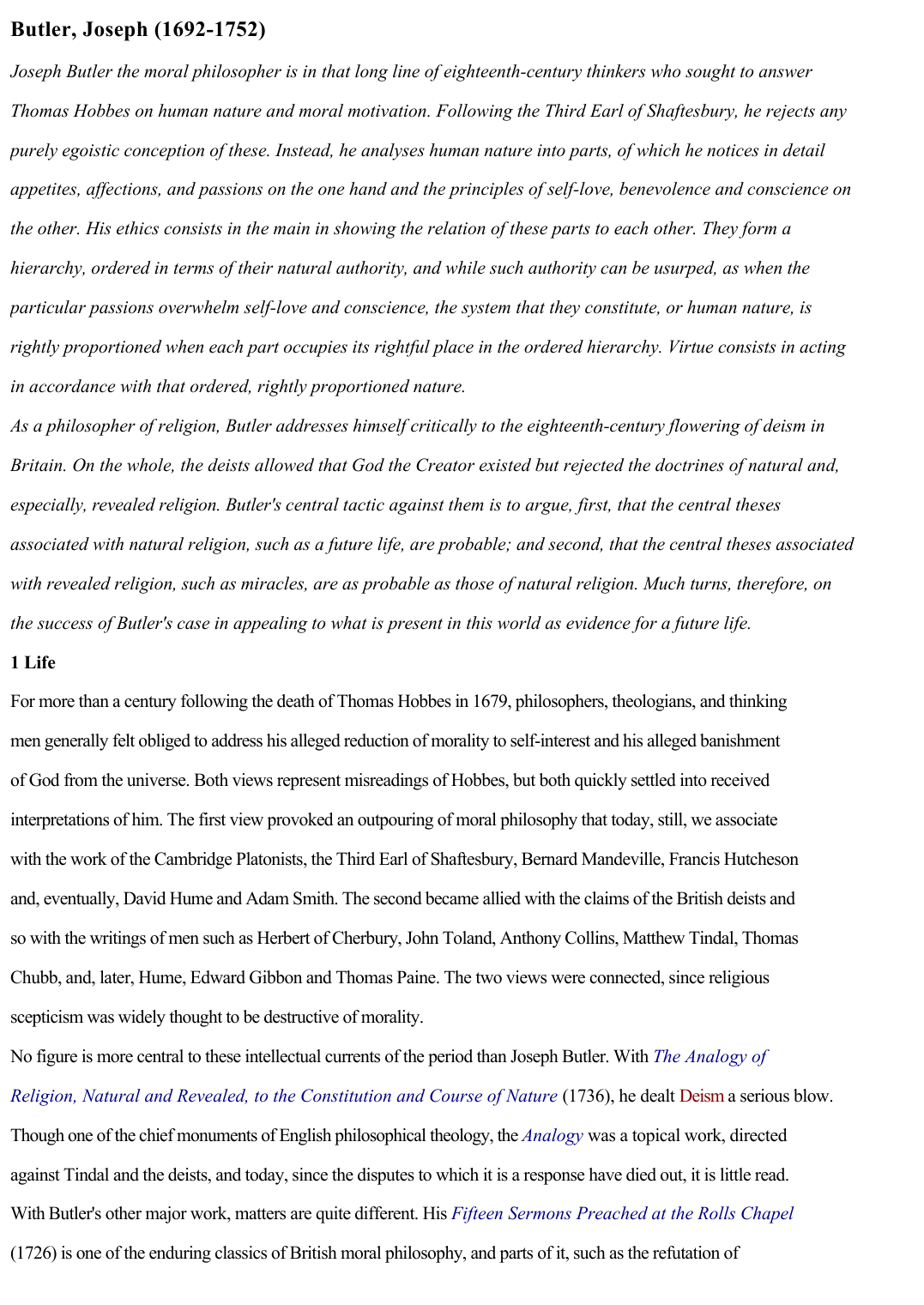Butler, Joseph
Publié le 16/05/2020

Extrait du document
«
Butler, Joseph (1692-1752)
Joseph Butler the moral philosopher is in that long line of eighteenth-century thinkers who sought to answer
Thomas Hobbes on human nature and moral motivation.
Following the Third Earl of Shaftesbury, he rejects any
purely egoistic conception of these.
Instead, he analyses human nature into parts, of which he notices in detail
appetites, affections, and passions on the one hand and the principles of self-love, benevolence and conscience on
the other.
His ethics consists in the main in showing the relation of these parts to each other.
They form a
hierarchy, ordered in terms of their natural authority, and while such authority can be usurped, as when the
particular passions overwhelm self-love and conscience, the system that they constitute, or human nature, is
rightly proportioned when each part occupies its rightful place in the ordered hierarchy.
Virtue consists in acting
in accordance with that ordered, rightly proportioned nature.
As a philosopher of religion, Butler addresses himself critically to the eighteenth-century flowering of deism in
Britain.
On the whole, the deists allowed that God the Creator existed but rejected the doctrines of natural and,
especially, revealed religion.
Butler's central tactic against them is to argue, first, that the central theses
associated with natural religion, such as a future life, are probable; and second, that the central theses associated
with revealed religion, such as miracles, are as probable as those of natural religion.
Much turns, therefore, on
the success of Butler's case in appealing to what is present in this world as evidence for a future life.
1 Life
For more than a century following the death of Thomas Hobbes in 1679, philosophers, theologians, and thinking
men generally felt obliged to address his alleged reduction of morality to self-interest and his alleged banishment
of God from the universe.
Both views represent misreadings of Hobbes, but both quickly settled into received
interpretations of him.
The first view provoked an outpouring of moral philosophy that today, still, we associate
with the work of the Cambridge Platonists, the Third Earl of Shaftesbury, Bernard Mandeville, Francis Hutcheson
and, eventually, David Hume and Adam Smith.
The second became allied with the claims of the British deists and
so with the writings of men such as Herbert of Cherbury, John Toland, Anthony Collins, Matthew Tindal, Thomas
Chubb, and, later, Hume, Edward Gibbon and Thomas Paine.
The two views were connected, since religious
scepticism was widely thought to be destructive of morality.
No figure is more central to these intellectual currents of the period than Joseph Butler.
With The Analogy of
Religion, Natural and Revealed, to the Constitution and Course of Nature (1736), he dealt Deism a serious blow.
Though one of the chief monuments of English philosophical theology, the Analogy was a topical work, directed
against Tindal and the deists, and today, since the disputes to which it is a response have died out, it is little read.
With Butler's other major work, matters are quite different.
His Fifteen Sermons Preached at the Rolls Chapel
(1726) is one of the enduring classics of British moral philosophy, and parts of it, such as the refutation of.
»
↓↓↓ APERÇU DU DOCUMENT ↓↓↓
Liens utiles
- Évaluation de lecture Autobiographie Un sac de billes de Joseph Joffo
- MÉRY (Joseph)
- Joseph Stalin .
- Andrieu, Jean-François d' Leclair, Jean-Marie Monteclair, Michel Pignolet de Mouret, Jean-Joseph
- Joseph Fourier


